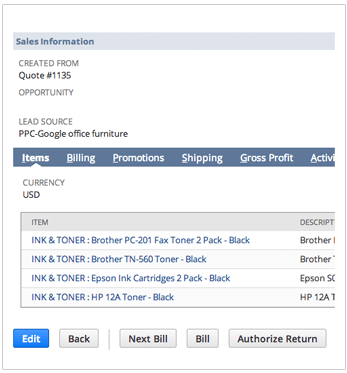Product Features
For Wholesale Distribution
Home / Order
Menu
Order
Take More Orders with Less Hassle
Can you receive orders through multiple channels including online, phone, EDI and more?
How quickly can you convert orders to cash?
NetSuite expands your orders to the omnichannel and fast-tracks your order-to-cash processes with built-in flows that eliminate manual bottlenecks, remove cumbersome rekeying, and reduce errors.
Orders in the Omnichannel
- Receive orders through EDI, web orders, direct sales, partner sales, point of sale and more.
- Segment reporting to measure performance by order channel.
- Gain real-time visibility across all channels on orders, customers, inventory and more.
Order to Cash
- Easily convert quotes to orders, orders to fulfillment, invoicing to payment and more with automated, built-in processes.
- Improve quote accuracy, eliminate billing errors, and strengthen revenue recognition.
- Increase revenue and customer lifetime value.

Business Impact
Customer Profitability
Measure success on a per customer level.
Cost to Serve
Understand what each customers costs.
Profitability by Segment
Improve efficiency with deep profit metrics.





























